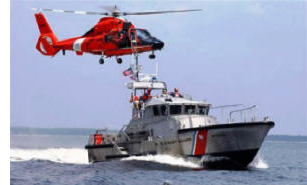Return to Division 5's Home Page.
Creation of the Auxiliary
In 1939 Congress established "a United States Coast Guard Reserve," administered by the Commandant of the Coast Guard and composed of unpaid, volunteer U.S. citizens who owned motorboats or yachts.
Purpose
In 1941, Congress created a military reserve of the Coast Guard and renamed the original volunteer reserve as the "Coast Guard Auxiliary."
Title 14, United States Code, contains the laws of a general and permanent nature about the Coast Guard. Section 822 of Title 14 states:
"The purpose of the Auxiliary is to assist the Coast Guard:
- to promote safety and to effect rescues on and over the high seas and on navigable waters;
- to promote efficiency in the operation of motorboats and yachts;
- to foster a wider knowledge of, and better compliance with, the laws, rules, and regulations governing the operation of motorboats and yachts; and
- to facilitate other operations of the Coast Guard."
These aims fall into two major categories that were stated in a memorandum to Congress accompanying the draft of the proposed bill ultimately enacted as the Act of September 30, 1944, chapter 453, 58 Stat. 759 (1944), as follows:
"The primary purpose of the establishment of the Coast Guard Auxiliary was to indoctrinate all owners and operators of small craft in safety requirements in the operation and navigation of small craft. A secondary purpose of the institution of the Coast Guard Auxiliary was to utilize the Auxiliary craft and personnel, after suitable training and indoctrination, in carrying out certain duties of the Coast Guard with particular reference to those concerned with the safety of navigation."
The Auxiliary is a valuable resource in arousing the interest of boaters in the Coast Guard's boating safety program. Section 823, Title 14, United States Code, provides that the Auxiliary shall be composed of U.S. citizens who are owners of motorboats, yachts, aircraft, or radio stations, or who because of their special training or experience are deemed by the Commandant to be qualified for membership in the Auxiliary. The statement accompanying this legislation indicated the respective roles contemplated for the owners of motorboats or yachts and the owners of aircraft or radio stations. The statement reflects the distinction that must exist between the preventive and remedial activities of the Coast Guard as the maritime safety agency of the Federal Government.
On the preventive side, it is believed that the Coast Guard could better promote safety in operation of small boats if it brings into a voluntary civilian organization persons interested in the safe operation of motorboats and yachts . . . .
Role of the Auxiliary

The United States Coast Guard is a military service and one of the five armed forces of the United States. However, the Coast Guard is also charged with many responsibilities that are civil in addition to their military missions.
The Auxiliary is an element of the U.S. Coast Guard, which also includes the Active Duty military Coast Guard, the Coast Guard Reserve, civilian employees, and Coast Guard Retirees.
In contrast to the active duty military and the reserve, the Auxiliary is specifically declared by statute to be nonmilitary. This defines the Auxiliary's role as entirely within the sphere of the Coast Guard's civil functions. The role of the Auxiliary does not extend to any military or direct law enforcement responsibilities of the service.
The Auxiliary's role is further defined by the - administrative authority of the Commandant. The Commandant determines how the Auxiliary may assist in performing civil missions of-the Coast Guard. The Commandant prescribes the training and qualifications of the Auxiliary necessary to perform this assistance and regulates these activities.
The role of the Auxiliary and its relationship to the other elements of the Coast Guard is defined by statutory law and administrative regulation. The active duty military and reserve members have exclusive responsibility for the military missions of the Coast Guard. The active duty, the civilian employees, the reserve, and the Auxiliary members, as specifically determined by the Commandant, perform the Coast Guard's civil missions.